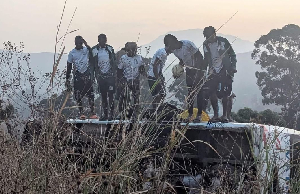A Cameroonian soldier lies in a trench, the tip of his Kalashnikov rifle pointing toward the Nigerian town of Gambaru, which has been taken over by Boko Haram terrorists.
A pickup loaded with Chadian troops crosses the bridge into Gambaru to reinforce their peers locked in an hours-long heavy exchange of gunfire with Boko Haram fighters.
A suspected terrorist attempts to cross the El Beid River, which separates Gambaru from Fotokol in Cameroon, but is hit by a bullet from a Cameroonian soldier.
That battle took place on February 11, but "fighting here has become a daily occurrence," says Maj. Nlate Ebale of the Rapid Intervention Battalion -- known as BIR -- of the Cameroon military.
Earlier this month, Boko Haram militants attacked Fotokol, burning churches, mosques and homes. They also slaughtered youths who resisted joining them. Almost 100 people died in the attack, said Col. Jacob Kodji, commander of the 4th Inter-Military Region.
"They came in at about 5 a.m. We were praying in the mosque, and all of a sudden we heard them shouting, 'Allahu akbar' ('God is great'). I left the mosque immediately and went home to my family. When I came back, they had slaughtered 37 people in the mosque," Modou Boukar, a Fotokol resident, told CNN.
The dusty roads of the once bustling town are now deserted. Frequent exchanges of gunfire between Boko Haram fighters and the combined Cameroonian and Chadian soldiers have driven many away. Only elderly people and some children remain, Kodji says.
"Chadian troops here have the mandate to fight Boko Haram right at their base in Gambaru," Ebale says. "We have to secure this bridge and stop the terrorists from crossing over into Cameroon. So we do work in synergy with Chadian forces here."
'They keep coming'
In February, Chadian troops launched a large offensive in Gambaru, using land and air forces, killing some 200 Boko Haram militants, Kodji says.
But Boko Haram keeps coming back.
"We kill them all the time, but we are surprised they keep coming. It is likely the intelligence services might have underestimated the striking power of the terrorists," Col. Joseph Nouma, commander of Operation ALPHA -- a special operation to weed out Boko Haram -- tells CNN.
"We register at least one to two Boko Haram attacks in different localities a day," he says.
Several African nations -- including Niger, Benin, Cameroon, Chad and Nigeria -- have pledged to deploy 8,700 troops, police and civilians as part of a regional effort to fight Boko Haram.
The violence in northeast Nigeria has caused more than 157,000 people to flee into Niger, Cameroon and Chad, Adrian Edwards, spokesman for the U.N. High Commissioner for Refugees, said in February. Nearly 1 million more people are believed to be internally displaced inside northeast Nigeria, according to Nigeria's national emergency management agency, Edwards said.
Capt. Bea Hob, who commands a Cameroon BIR unit, says that on October 15, Boko Haram carried out simultaneous attacks on the Cameroon towns of Amchide and Limani, killing eight Cameroonian soldiers and dozens of civilians.
Amchide, 15 kilometers (9 miles) from Fotokol, borders Nigeria's Borno state, a stronghold of the Islamist terrorist group. Since the insurgents began regular cross-border raids this year, killing hundreds of Cameroonians, most of the town's residents have fled south. Only a few elderly people remain, Hob says.
Military moves in, becomes a target
Amchide has become a military base to protect the area from insurgents. Soldiers patrol the streets in armored vehicles and lie in trenches. But the military has become a major target for Boko Haram attacks.
"It was at about 4 a.m. when we heard them shouting from four different angles of our base. Then it was clear that their intention was to strike our base. It was definitely a difficult situation to handle, given that they were coming from different directions.
"I ordered that the lone tank we had should be deployed in such a way that the terrorists would think we had at least four tanks. So we would rush to one angle, shoot for about 15 minutes and then rush to the next angle, shoot for 15 minutes. ... Within hours, we were able to put the terrorists to rout," Hob says.
He said Boko Haram has been shifting its tactics. Unable to carry out direct combat with Cameroonian soldiers, they use improvised explosive devices to ambush military convoys and civilian buses, disrupting movement of goods and people in the region.
Cameroon security sources say that Boko Haram attacks villages "to steal food, carry out forced marriages on the girls they kidnap; forcefully recruit children who are later brainwashed to joining their hate doctrine, as well as steal weapons."
Porous borders ease their incursions into Cameroon.
A spokesman for the Cameroon Defense Ministry, Col. Didier Badjeck, says that since the war began some two years ago, Cameroon has killed more than 2,000 Boko Haram fighters and lost about 100 soldiers.
Actualités of Sunday, 22 February 2015
Source: cnn.com













